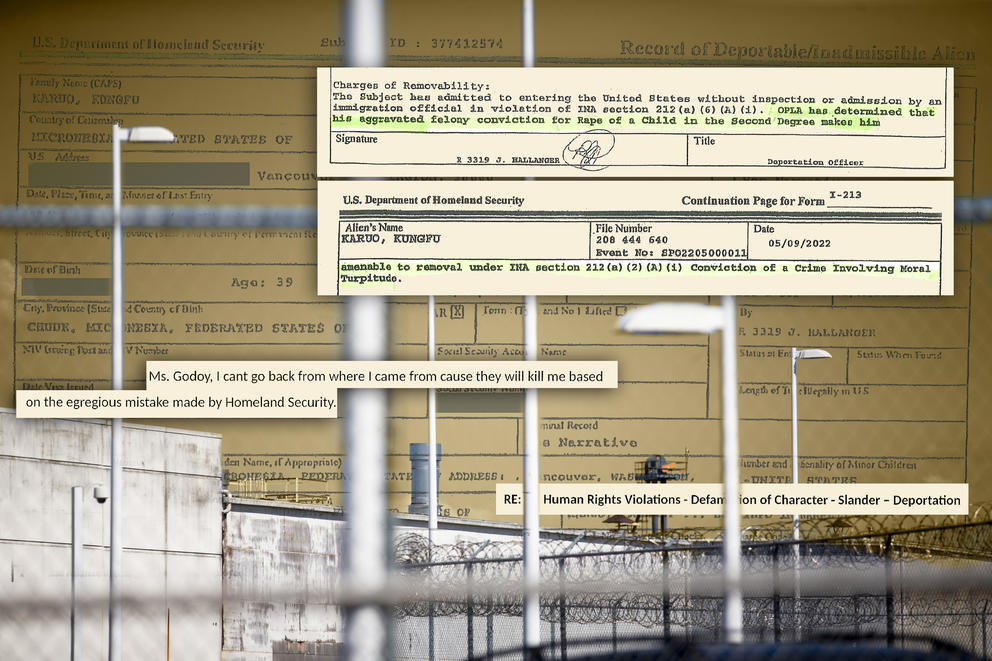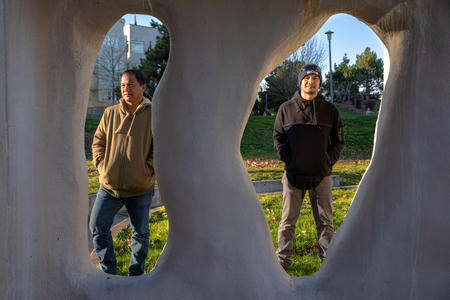Detainee Kungfu Karuo, 41, repeatedly appealed to officials and advocates for help clearing his name, sending letters that described attacks against his family over the improper charge.
“I can’t go back from where I came from cause they will kill me based on the egregious mistake,” he wrote in January. “This has continued to cause my family members unnecessary wanton infliction of pain where they have been severely assaulted.”
Karuo sent advocates his 2022 deportation forms, which listed a conviction for second-degree child rape, considered a “crime involving moral turpitude.” Despite his felony criminal history, he denied any sex-crime convictions in the U.S. or elsewhere. Advocates also ran an independent criminal background check that found no such charges.
Cascade PBS spent months seeking evidence to explain the discrepancy, speaking with local immigration advocates and requesting information from U.S. Immigration and Customs Enforcement. After ICE officials initially rejected a Freedom of Information Act request for documents corroborating the conviction, an ICE attorney earlier this month confirmed the child rape charge was an error and provided records showing a correction in Karuo’s file.
By then, ICE had already deported Karuo in April. ICE spokesperson David Yost responded by email that the Seattle field office is “not providing comment.”
Angelina Snodgrass Godoy, director of the Center for Human Rights at the University of Washington, said the difficulty of proving a charge erroneous shows how hard it can be to address injustices in the U.S. immigration system.
“It was very, very upsetting,” she said, “and just another illustration, I think, sadly, of how immigration law in this country is so morally bankrupt that it offers us so few tools to defend core human rights.”
Records show Karuo first went into ICE custody in May 2022 after serving a prison sentence for felony burglary, possession of a stolen vehicle and other crimes committed in the Vancouver, Washington area. At the time, a U.S. Department of Homeland Security officer filed a “Record of Deportable/Inadmissible Alien” form outlining his immigration and criminal history.
The form states “his aggravated felony conviction for rape of a child in the second degree makes him amenable to removal under ... conviction of a crime involving moral turpitude.” His Notice to Appear form, the first step in deportation court proceedings, also declared convictions for “crimes involving moral turpitude.”
There is no statutory definition of moral turpitude, but one case, tried in the U.S. District Court in Washington, D.C., describes the term as “conduct that shocks the public conscience as being inherently base, vile, or depraved, contrary to the rules of morality and the duties owed between man and man, either one’s fellow man or society in general.”
Godoy said while she is not sure if crimes of moral turpitude hold different legal significance in deportation proceedings, they still “certainly have a different significance in ICE’s internal prioritization system.” She pointed to Karuo’s aggravated felony conviction, which she said would have provided enough grounds for deportation – but a sex crime could be weaponized for “political reasons.”
“It could be just to torment him because of some personal animosity,” she said, “or it could be also to inflate their numbers because they love to report the numbers of people with horrifying-sounding crimes.”
ICE’s Yost did not respond to a Cascade PBS inquiry to clarify whether a crime of moral turpitude would expedite one’s deportation.
Earlier this month, ICE officials provided Cascade PBS with a copy of an I-261 form in Karuo’s case, which can be used to correct past charges “in lieu of those set forth in the original charging document.” In that document, Karuo was no longer being deported for a crime of moral turpitude, but rather for an aggravated felony, and it made no reference to any sex crimes.
The correction form is dated June 29, 2022, less than two months after Karuo first entered ICE custody, but it remains unknown how or if those changes were made clear to Karuo. The form stated he received a copy by “intrafacility mail.”
Online court records show that an immigration judge issued an order for his removal the very next day. Karuo wrote in a letter that COVID-19 restrictions delayed his initial deportation. A motion was filed earlier this year to reopen his case, but it was denied.
In a January letter to Godoy, Karuo alleged that a fellow detainee from Micronesia had come to learn about the mistaken child rape charge in 2023 and threatened to tell others in his hometown about the crime. He said he began hearing threats against his family shortly after that detainee was deported in the summer of 2023.
Karuo also provided letters from Micronesian government officials corroborating police reports from his family members that described being attacked by masked men looking for him.
“It is with clear understanding that if Mr. Karuo is deported to the Federated States of Micronesia his life will be in immediate and immense danger,” states a letter signed by the lieutenant governor of the State of Chuuk in Micronesia.
Cascade PBS obtained these letters from advocates working with Karuo, but have not been able to independently confirm their authenticity. Karuo wrote that the incorrect conviction, the endangerment of his family and his pending deportation had all taken a psychological toll.
“I have pointed this out to ICE,” he wrote, “and certainly they have not been able to acknowledge such an egregious mistake.”
Godoy told Cascade PBS that she initially hesitated to get involved with Karuo’s case since the Center for Human Rights does not have staff attorneys or the capacity to take on individual clients. But she did pay for the Washington State Patrol to run a criminal background check. She provided a copy of the report to Cascade PBS.
“I was pretty shocked,” she said. “Because it showed that everything in his letter was true, and that he had never been accused, much less convicted, of child molestation, and yet that was very clearly mentioned in the ICE records.”
Maru Mora-Villalpando works as an immigration activist with La Resistencia, a local group led by undocumented organizers who protest human rights abuses at the detention center. She said Karuo is not the first instance in which a detainee has reached out alleging a false charge. She said she believes Karuo has faced retaliation for his connection with a hunger strike last year, which resulted in guards tear-gassing detainees.
“It was through somebody else who told us that he had been charged with this horrible, horrible crime that he didn’t commit, and then he talked to us — he was obviously very afraid — he was afraid of talking to us, because he knew that retaliation,” she said. “He already lived the retaliation of organizing and he knew that talking to us was also a risk.”
La Resistencia itself cannot offer legal counsel, but the group makes consistent visits to the detention center with an accompanying attorney. In early March, Mora-Villalpando sent an attorney to retrieve Karuo’s signature for permission to release records to Cascade PBS.
Advocates working with Karuo reported he was deported in April. His online court docket lists no pending hearings, and as of May he no longer appears in the ICE detainee locator system.
Mora-Villalpando said ICE operates with a high level of impunity — and from her experiences, it has been virtually impossible to pressure the agency into publicly admitting mistakes.
Since learning about Karuo’s deportation, Mora-Villalpando said she has worked to reach him in Micronesia, hoping to relay the news of his innocence.
“We’re gonna try to find Kungfu. We’re gonna do our best,” she said. “I really hope that we can get this published in some news outlet in Micronesia, and use this somehow to not only make sure that people in Micronesia see it was all a lie and they actually need to protect him — but also there should be some efforts to bring him back and for him to have a fair fight again.”
Get the latest investigative news
A newsletter for resources, data and behind-the-scenes insight into investigative efforts.









